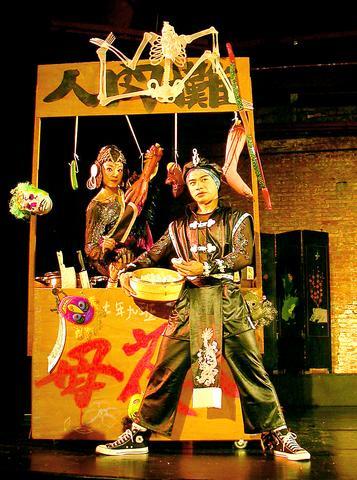Wu Hsing-guo (吳興國) is well-known as a maverick in Chinese opera circles.
When he set up Contemporary Legend Theater (當代傳奇劇場) in 1984 and put on its debut performance The Kingdom of Desire, adapted from William Shakespeare's Macbeth, in 1986, the performance's bold mix of Western song-and-dance, modern theater, traditional Chinese opera and the adaptation of a Western play won as much applause as criticism.

PHOTO: VICO LEE, TAIPEI TIMES
Wu proved to be way ahead of his times as the modernizing of traditional performance genres and the blending of performance styles of different cultures have since not only been widely accepted but have even become the dominant trend in performance arts in the 1990s.
Wu's later adaptation of Medea, Oresteia and King Lear have been increasingly appreciated both here and abroad.
Just as the shock value of works by Contemporary Legend Theater has depreciated, Wu, artistic director of the group, has come up with Hip Hop Comedy, a genre inspired by a folksy branch of traditional Chinese opera in which actors play with the plots of standard numbers with a modern-day twist to nonsensical humor.
A Play of Brother and Sister (兄妹串戲), the theater group's first production of the new genre, will be Wu's latest attempt at further pushing the envelope of Chinese opera.
Dai Li-wu (戴立吾) and Chian Yu-shan (錢宇珊), both in their early 20s, play the young brother and sister, who act out famous passages from altered folk legends, to pop music with hip hop rhythms, including two theme songs by popular mandarin singer Emil Chou.
The songs mirrot high school students' playful attitudes toward heroic episodes in history textbooks, mirroring the brother and sister's subversion of traditional Chinese opera numbers.
A Play of Brother and Sister remains traditional in its singing style and martial arts scenes. The most ingenious parts of its innovations are probably the costumes and props. The brother (playing the tiger-conquering folklore hero Wu Song), in a pair of converse sneakers, breaks into a vehement fight with his sister, playing his murderous nemesis (in fish-net pants and ballet shoes) is a highlight of the show.
A Play of Brother and Sister will be performed at 8pm tonight and at 3pm and 8pm tomorrow at the Red Playhouse (紅樓劇場), 10, Chengdu Rd., Taipei (台北市成都路10號), before moving to the Gang Shan Performance Hall (岡山演藝廳) and Feng Shan Sun Yat-sen Memorial Hall (鳳山國父紀念館演藝廳) in Kaohsiung county. For more information, call Contemporary Legend Theater at (02) 23692616.

The canonical shot of an East Asian city is a night skyline studded with towering apartment and office buildings, bright with neon and plastic signage, a landscape of energy and modernity. Another classic image is the same city seen from above, in which identical apartment towers march across the city, spilling out over nearby geography, like stylized soldiers colonizing new territory in a board game. Densely populated dynamic conurbations of money, technological innovation and convenience, it is hard to see the cities of East Asia as what they truly are: necropolises. Why is this? The East Asian development model, with

June 16 to June 22 The following flyer appeared on the streets of Hsinchu on June 12, 1895: “Taipei has already fallen to the Japanese barbarians, who have brought great misery to our land and people. We heard that the Japanese occupiers will tax our gardens, our houses, our bodies, and even our chickens, dogs, cows and pigs. They wear their hair wild, carve their teeth, tattoo their foreheads, wear strange clothes and speak a strange language. How can we be ruled by such people?” Posted by civilian militia leader Wu Tang-hsing (吳湯興), it was a call to arms to retake

This is a deeply unsettling period in Taiwan. Uncertainties are everywhere while everyone waits for a small army of other shoes to drop on nearly every front. During challenging times, interesting political changes can happen, yet all three major political parties are beset with scandals, strife and self-inflicted wounds. As the ruling party, the Democratic Progressive Party (DPP) is held accountable for not only the challenges to the party, but also the nation. Taiwan is geopolitically and economically under threat. Domestically, the administration is under siege by the opposition-controlled legislature and growing discontent with what opponents characterize as arrogant, autocratic

When Lisa, 20, laces into her ultra-high heels for her shift at a strip club in Ukraine’s Kharkiv, she knows that aside from dancing, she will have to comfort traumatized soldiers. Since Russia’s 2022 invasion, exhausted troops are the main clientele of the Flash Dancers club in the center of the northeastern city, just 20 kilometers from Russian forces. For some customers, it provides an “escape” from the war, said Valerya Zavatska — a 25-year-old law graduate who runs the club with her mother, an ex-dancer. But many are not there just for the show. They “want to talk about what hurts,” she